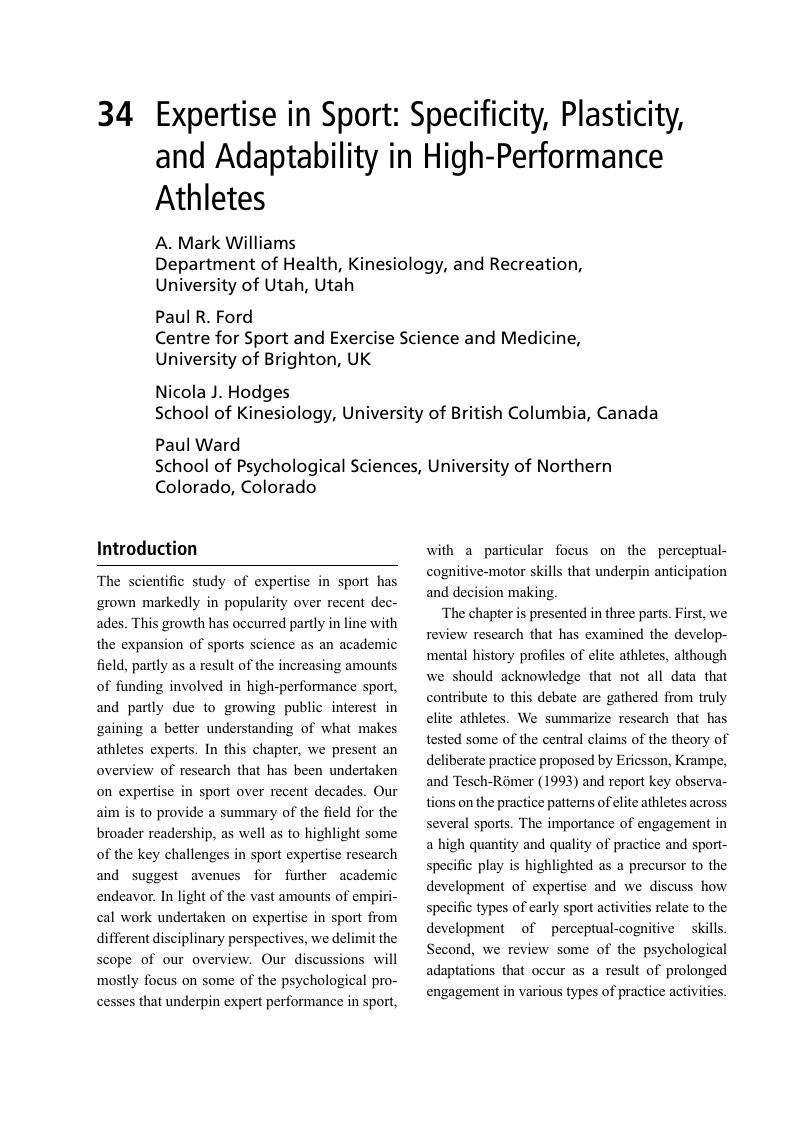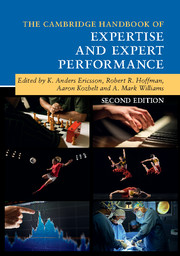Book contents
- The Cambridge Handbook of Expertise and Expert Performance
- The Cambridge Handbook of Expertise and Expert Performance
- Copyright page
- Contents
- Notes on Contributors
- Acknowledgments
- Part I Introduction and Perspectives
- Part II Overview of Approaches to the Study of Expertise: Brief Historical Accounts of Theories and Methods
- Part III Methods for Studying the Structure of Expertise
- Part IV Methods for Studying the Acquisition and Maintenance of Expertise
- Part V.I Domains of Expertise: Professions
- Part V.II Domains of Expertise: Arts, Sports, Games, and Other Skills
- 28 Expertise in Music
- 29 Brain Changes Associated with Acquisition of Musical Expertise
- 30 Expertise in Drawing
- 31 Expertise in Chess
- 32 Mathematical Expertise
- 33 Expertise in Second Language Vocabulary
- 34 Expertise in Sport: Specificity, Plasticity, and Adaptability in High-Performance Athletes
- Part VI Generalizable Mechanisms Mediating Types of Expertise
- Part VII General Issues and Theoretical Frameworks
- Index of Subjects
- References
34 - Expertise in Sport: Specificity, Plasticity, and Adaptability in High-Performance Athletes
from Part V.II - Domains of Expertise: Arts, Sports, Games, and Other Skills
Published online by Cambridge University Press: 10 May 2018
- The Cambridge Handbook of Expertise and Expert Performance
- The Cambridge Handbook of Expertise and Expert Performance
- Copyright page
- Contents
- Notes on Contributors
- Acknowledgments
- Part I Introduction and Perspectives
- Part II Overview of Approaches to the Study of Expertise: Brief Historical Accounts of Theories and Methods
- Part III Methods for Studying the Structure of Expertise
- Part IV Methods for Studying the Acquisition and Maintenance of Expertise
- Part V.I Domains of Expertise: Professions
- Part V.II Domains of Expertise: Arts, Sports, Games, and Other Skills
- 28 Expertise in Music
- 29 Brain Changes Associated with Acquisition of Musical Expertise
- 30 Expertise in Drawing
- 31 Expertise in Chess
- 32 Mathematical Expertise
- 33 Expertise in Second Language Vocabulary
- 34 Expertise in Sport: Specificity, Plasticity, and Adaptability in High-Performance Athletes
- Part VI Generalizable Mechanisms Mediating Types of Expertise
- Part VII General Issues and Theoretical Frameworks
- Index of Subjects
- References
Summary

- Type
- Chapter
- Information
- The Cambridge Handbook of Expertise and Expert Performance , pp. 653 - 674Publisher: Cambridge University PressPrint publication year: 2018
References
- 7
- Cited by



